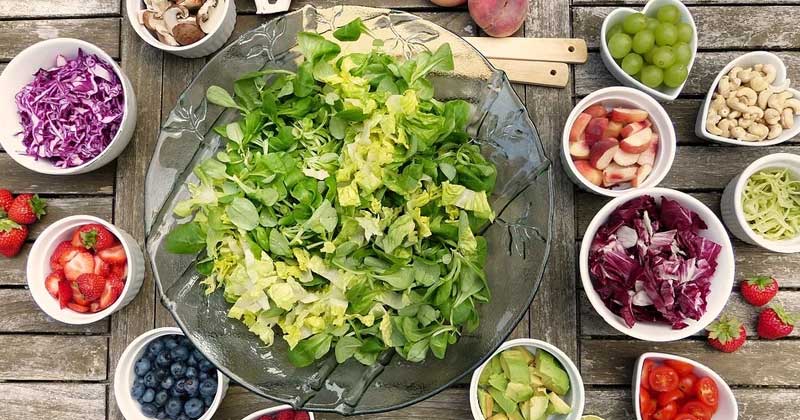The vegan diet plan for weight loss is better than almost any other diet to get rid of excess fat. Meat eaters have a much harder time compared to vegans if they want to lose weight. In addition, the vegan diet does not lead to deficiency symptoms, but even improves the nutritional values in the blood. Of course, all of this has long been scientifically confirmed.
A vegan diet helps you lose weight
Losing weight with the vegan diet always means turning to nature because artificial food additives such as flavor enhancers, flavors, and other chemical addicting substances are one of the main reasons for being overweight. So if you want to finally feel comfortable in your body, then it is time to follow the vegan diet plan for weight loss. You should stick to foods that nature provides for you. This includes fruits, vegetables, herbs, berries, nuts, seeds, and kernels. A vegan diet helps to reduce body weight in a healthy way. Vegans lose weight much more easily than meat-eaters and even easier than vegetarians.
Our body is optimized for the consumption of fruits, herbs, and green leafy vegetables. Nowadays, the diet that comes closest to this optimal state is the vegan diet. That’s why it’s pretty easy to lose weight by following the vegan diet plan for weight loss. Your body is a high-performance machine and if you give it the right fuel, it will accelerate. As a herbivore, you have undeniable advantages over protein junkies or meat-eaters.
Healthy Fats and Proteins

A common misconception with the vegan diet plan for weight loss is that fat is bad. In reality, to lose weight successfully, you need healthy fatty acids in a purely plant-based diet. You can find these in ripe avocados, bananas, nuts, seeds, and seeds. In addition, you can soak nuts and kernels overnight and then rinse again before you eat them. Because these foods contain enzyme inhibitors that disrupt your digestion and are only broken down by water. Extra virgin olive oil is another healthy source of fatty acids.
Vegan Diet Plan For Weight Loss With Exercise: Endurance And Cardio
Exercise is of course just as much a part of a vegan diet plan for weight loss as proper nutrition. Regular training sessions get your metabolism going and melt away your excess body fat. Jogging and walking, for example, are extremely effective to complement your vegan weight loss plan. Endurance sports and cardio sessions give you a positive feeling. 1 to 2 hours of intensive training a day can change not only you but your whole life for the better.
Push-ups and pull-ups, as well as lightweight training or boxing and swimming sessions, help immensely in burning fat. If you’re serious about losing weight vegan, your muscles need to be challenged as well as your endurance. The more disciplined you stick to your training plan, the faster you will lose weight as a vegan.
Vegan Diet Plan For Weight Loss: Slimming With Superfoods

Vegan Diet Plan For Weight Loss that includes superfoods can actually support accelerated fat loss. Barley grass and wheatgrass prove particularly useful as a part of the vegan diet plan for weight loss. They offer a basic balance to the contained fruits and are also very substantial.
Vegan Diet Improves Blood Nutrient Levels
The vegan diet provides more nutrients than a diet that includes animal products. Those study participants who had a vegan diet had better nutrient values in the blood. At the same time, the blood fat levels of vegans decreased, which, especially together with being overweight, can lead to negative health effects. So both risk factors could be reduced by the vegan diet.
Vegan Diet Plan For Weight Loss: What to Consume
If you want to lose weight successfully and want a fit body in the long run, you have to understand how our human body works. Our body is a high-performance machine and absolutely cannot be tricked. You should always include macronutrients in your diet plan. You don’t really need to eat less, but really eat the right things in the right quantities.

What can you eat following the Vegan Diet Plan For Weight Loss
Fruit
– apples
– citrus fruits (lemons, grapefruit, oranges, limes)
– berries (raspberries, strawberries, currants)
– grapes (green and black)
Vegetables
– cucumbers
– celery
– carrots
– hot peppers/chilies
Herbs

– wild garlic
– oregano
– chives
– garlic
Legumes
– Lentils (brown)
– Peas
– Green beans
– Red lentils
Suggested Read- Vitamin B12 Foods for Vegans
Please keep in mind that the intestinal flora adapts to our diet. A sudden and drastic change in diet can, therefore, lead to slight indigestion in the short term. You can prevent this by gradually changing your diet and possibly supporting your intestines by taking a probiotic supplement. If you want to live consistently and permanently vegan, you should take a vitamin B12 preparation as a precaution.


